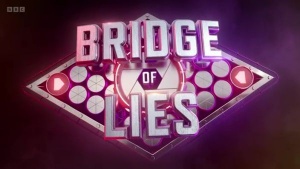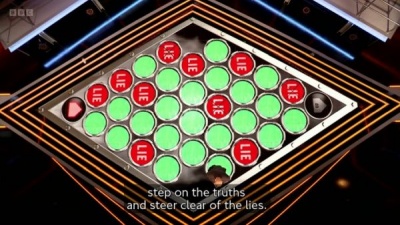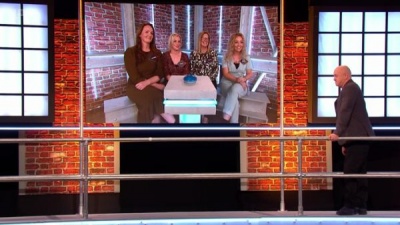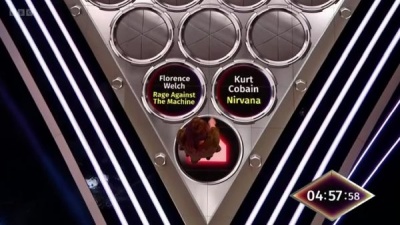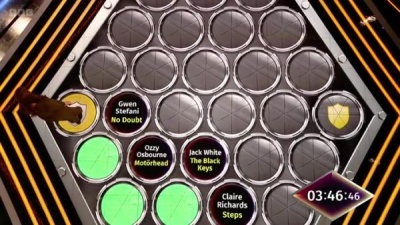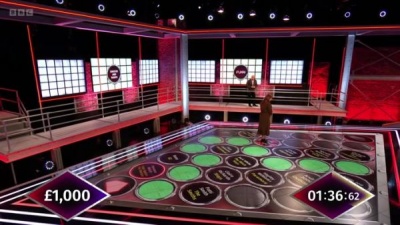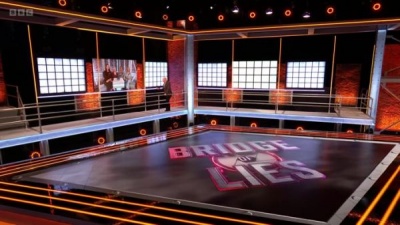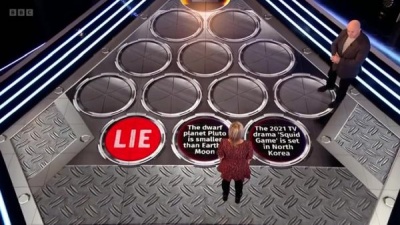Bridge of Lies
(→Trivia) |
(→Catchphrases) |
||
| Line 96: | Line 96: | ||
''I can't help you'' - and if this one was deliberate, we'll eat our hats. | ''I can't help you'' - and if this one was deliberate, we'll eat our hats. | ||
| - | ''Go with your gut'' - if a contestant looks like they might talk themselves out of a correct choice, Ross will often say this to nudge them back on the right track. So he ''can'' help them... a little. | + | ''Go with your gut'' - if a contestant looks like they might talk themselves out of a correct choice, Ross will often say this to nudge them back on the right track. So he ''can'' help them... a little. Similarly he'll sometimes attempt to steer a player away from an incorrect answer by reminding them ''Take a look around you'' or some variation thereof. |
''There are no available lies to reveal'' - to be fair, we've only heard this once so far. But the phrase is there in the bank, just in case a contestant manages to mess up the early part of the game that badly. | ''There are no available lies to reveal'' - to be fair, we've only heard this once so far. But the phrase is there in the bank, just in case a contestant manages to mess up the early part of the game that badly. | ||
Revision as of 07:04, 4 April 2024
Synopsis
Step on the truths and steer clear of the lies.
Our contestants are faced with a "bridge", a way to cross from the start to the finish. The bridge is made up of many individual circles, tessellated in a hexagonal pattern. The task is to step on the truths, and not step on the lies. What could be more simple?
Ross Kemp, our host, explains everything in the first 30 seconds of the show.
Every episode follows one team from the Waiting Room to the final round. The game is played by a team of four, they'll each have their five minutes in the spotlight.
After hearing a category, one of the team steps forward (or is pushed forward) to meet Ross on the main floor. Yes, that Ross Kemp, the EastEnders actor was an unexpected choice for this show, but turns out to be exactly right for it.
The challenge: get from the start to the finish by forming an unbroken path of truths. There is always a true path to be found, but it might wind and won't be obvious. Hiding amongst the answers are ten lies, answers that don't fit the category.
For instance, if the category is "Singers and bands", the answer "Kurt Cobain – Nirvana" is true, because Kurt was the singer with Nirvana. "Florence Welch – Rage Against the Machine" is false, she's not Zack de la Rocha.
Each correct answer earns £100 for the pot, and opens up the answers on the adjacent circles. As the contestant gets further along the bridge, the answers become more obscure. The round has a time limit of five minutes.
There are two safety zones at the corners of the bridge. When a contestant reaches a safety zone, they get to stop the clock for a brief moment, and the bridge will reveal one of the lies uncovered on their journey.
Should a player may step on a lie, the money in their pot gets halved – the £1000 becomes £500, and it does not open up any new possible answers. Remember, the objective is to form an unbroken path of true answers. Three lies will end the round at once.
However, all may not be lost. The players in the waiting room – those who are yet to play – are watching progress on a screen. They have a "panic button", and can press it at any moment. When they press the button, it ends the round at once – the player advances to the final with whatever money they had in their kitty at that moment. Subsequent play is ignored, whether that was a win or a loss.
After each player has had their solo round, we reach the final. The surviving players come out for what they earned in the main game. Before the final round proper begins, the bridge makes an offer. You can play on as you are, for the money you've earned. You can sell one of your players, and the bridge will double the stakes. Or you can buy back a player, but it'll cost half the money in the pot. Play for £1500 and three people, or £3000 and two people, or £750 and all four?
The final round is to spot the one truth in each set. As in the main game, the statements start quite easy and get harder.
The time is shown in an unusual way. A "wave" of colour starts at the far end of the bridge, and the player needs to stand on a statement before it reaches the row they're playing on. The "wave" moves at a consistent speed, so the first choices have plenty of time available, the last choice has next to no thinking time. The contestant is eliminated if they don't pick an answer, or if they stand on a lie.
Each player allows an extra mistake in the final round – a full team is allowed to make three mistakes, the solo player has to get absolutely everything right. Are you more likely to succeed with an extra player; can you possibly succeed with a player less? The decision makes it much harder to win, or somewhat easier.
There were things to tweak, the red-green contrast didn't pick out the found lies for colourblind viewers. A good team can reach the last (or even the penultimate) row of the final crossing with enough players to make the win a certainty ahead of time (so why make them carry on?); a bad team can play for £500 (between four: is it worth watching?). General reaction was positive. Bridge of Lies has good gameplay, clear graphics, and lots of playalong value.
Indeed, the show did so well that the second series actually aired six days a week; civilian episodes Monday to Friday and celebrity specials on Saturdays. The design of the "wave" in the final round changed to resemble a sea wave advancing up the beach; the more significant alteration was that the last individual round is now played for double the value (£200 per truth), potentially encouraging teams to save their strongest quizzer for last rather than sending them out while the panic button is still in play. And should a player be eliminated on the last 50/50 choice of the final crossing, an incoming player now gets a new pair of statements, so that a win is no longer a foregone conclusion. The third series drops the initial row of two from the final crossing - the lie on this first row was usually an obvious joke that was never going to catch anyone out anyway, so its removal is no great loss.
Catchphrases
Truth, or lie?
It is a truth. That opens up…
Did you or did you not press the panic button?
That's a lie - you've halved your money.
I can't help you - and if this one was deliberate, we'll eat our hats.
Go with your gut - if a contestant looks like they might talk themselves out of a correct choice, Ross will often say this to nudge them back on the right track. So he can help them... a little. Similarly he'll sometimes attempt to steer a player away from an incorrect answer by reminding them Take a look around you or some variation thereof.
There are no available lies to reveal - to be fair, we've only heard this once so far. But the phrase is there in the bank, just in case a contestant manages to mess up the early part of the game that badly.
Inventor
An STV Studios Format Developed by Josephine Brassey and Dorsa Nam
Theme music
Lawrence Oakley
Trivia
Aired at 4.30, possibly because ITV had its spring racing coverage, and both Tipping Point and The Chase were in repeats.
An episode went out at 4.45 on Saturday 26 March 2022, as the World Cup draw on 1 April 2022 was taking over the usual slot, and with episodes 12-15 airing Monday-Thursday. This Saturday edition was separated from the other game shows by Superman & Lois and the news. Episode 15 aired in a weekday slot three weeks after the second series finished, as the entire first series was repeated right after the second.
Something you may not have noticed (but will notice every time once you know) is that on each crossing there are usually two cutaways to Ross saying "remember, we are looking for [whatever it is]", and those two cutaways are usually the same clip. You'd think they could manage to do two variations for it - it would take a matter of seconds.

